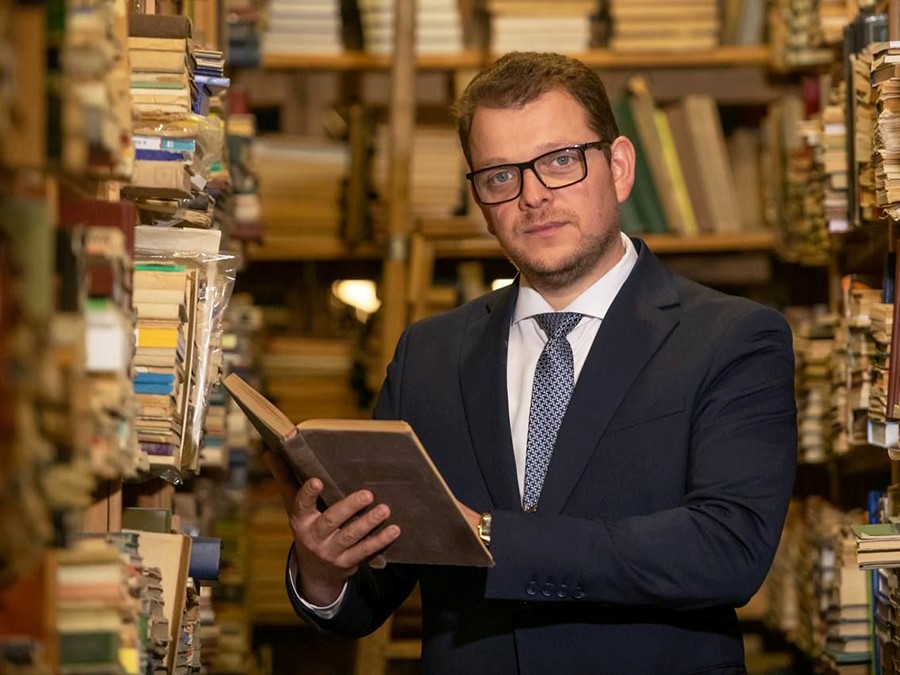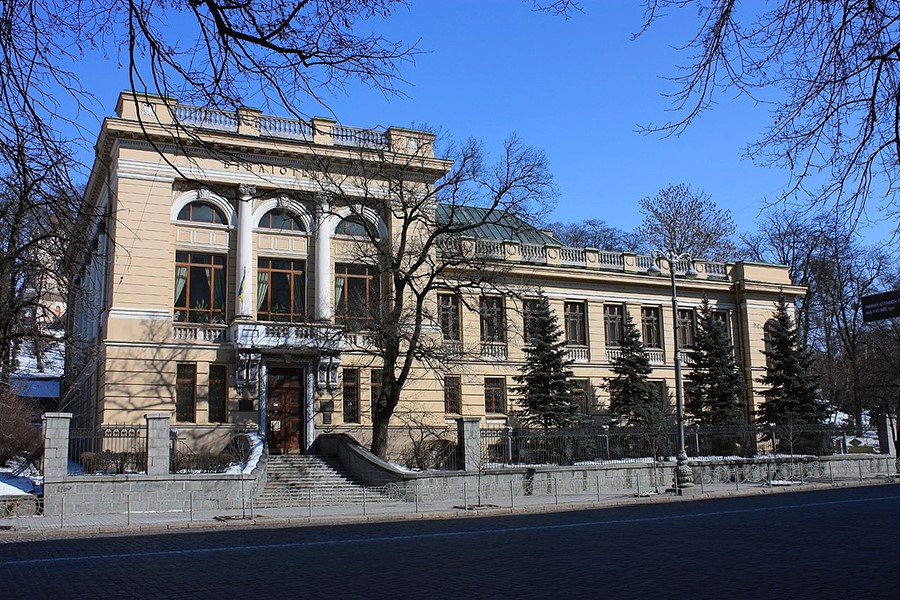"Civilization must defeat barbarism"

Jordanka Beleva
24.05.2024

Oleh Serbin
Interview with Oleh Serbin, Director of the Yaroslav the Wise National Library of Ukraine
Since the beginning of the war with Russia, the National Library of Ukraine has also turned into a bomb shelter. We can all see the horror of evacuating people, but please tell us how to evacuate books?
As a result of the full-scale Russian aggression, as of the March 25, 2024, 1 974 cultural institutions have been damaged. Aiming to destroy Ukraine's cultural values the enemy deliberately targets cultural heritage sites.
According to the 8th stage of the «Public Libraries of Ukraine in the Context of Russian Armed Aggression» study conducted by the Yaroslav Mudryi National Library of Ukraine, as of March 30, 2024 (from the beginning of the full-scale invasion) there are:
- 154 libraries destroyed and cannot be restored;
- 768 libraries damaged, of which: 360 libraries were partially damaged and require major repairs; - 408 libraries sustained minor damage (require replacement of windows, doors, partial repair of roofs and facades).
Almost the entire territory of Luhansk and large parts of Zaporizhzhia, Donetsk and Kherson regions of Ukraine are still under temporary occupation, that’s why it’s impossible to calculate the exact number of cultural institutions suffered during the fighting and occupation.
The enemy does not warn us where it will target next. Learnt by bitter experience, libraries in the frontline areas are taking preventive measures (moving valuable collections to other cities, outside the regions close to the front line. That is, they arrange locations for books, primarily rare and valuable, in safe places). For security reasons, this information is not disclosed.
In order to increase the efficiency and effectiveness of responding to emergencies, in particular those related to Russia's military aggression, the Yaroslav Mudryi National Library of Ukraine is taking appropriate measures, creating special groups of employees responsible for the evacuation of collections, among other things. Similarly, each library, guided by the current regulatory documents, takes measures, approves its internal documents, which prescribe the procedure for acting under threats.
However, I would like to emphasize that our library and the most public libraries in Ukraine continue to work in the face of war challenges, security issues, and the current needs of users.
Have librarians acquired extraordinary responsibilities?
Libraries, as social institutions with an extensive network, offline and online platforms for sharing professional experience, take measures to support the mental health of the population of all regions; they are actively involved in helping internally displaced persons, the military and their families, and other vulnerable groups, and work with all age groups.
Some of the non-standard library services that have become commonplace for librarians during the war and continue to develop include:
- Volunteering (various areas of support for the Armed Forces of Ukraine (weaving camouflage nets, sewing necessary items, making trench candles, energy bars, etc.), helping wounded soldiers in hospitals, helping Ukrainians in difficult life circumstances, etc.);
- Working with internally displaced persons;
- Using library premises as a shelter;
- Creation of the so called «Punkty nezlamnosti» (places of steadfastness, strongholds) in libraries (in Kyiv, Vinnytsia, Zaporizhzhia and other Ukrainian cities). These are «islands of safety» where twenty-four hours a day, regardless of the availability of central power supply in the city one can always have access to heat, water, lighting, mobile communication, the Internet, recharging for mobile devices, hygiene products, places for rest, essential food, first aid kits, etc;
- Giving out of libraries services, e.g. in the subway (Kharkiv), arranging library shelves and holding leisure activities in shelters (Lviv, Kropyvnytskyi, Zaporizhzhia, etc.);
- Giving psychological support for different age groups of users. Organizing psychological support training sessions for both librarians and library users, and implementation of thematic projects. Recently, for example, 31 librarians from different libraries in Ukraine were trained in Hibuki therapy (toy therapy, a method borrowed from Israel). The libraries have already hosted the first events designed to help Ukrainian children through difficult times;
- Organizing first aid trainings;
- Lectures and trainings on mine safety;
- Providing books to the military (for example, the All-Ukrainian action «Library of the Ukrainian Warrior» initiated by the Ministry of Culture of Ukraine. During the campaign, the prime examples of national and world fiction, popular science publications on the history of Ukraine, its culture, and the Armed Forces are accepted and transferred to the libraries of military units of the Armed Forces of Ukraine. The campaign is coordinated by the Yaroslav Mudryi National Library of Ukraine);
- Providing books to Ukrainians abroad (e.g., the «Books in the Wake» campaign initiated by the Lesya Ukrainka Public Library in Kyiv, etc.);
- Disseminating information about successful practices and experience of bibliotherapy and psychosocial support in public libraries of Ukraine on professional platforms (blogs, social networks, websites).
Did the Russians manage to destroy valuable manuscripts and documents of Ukraine?
The enemy's first steps towards libraries in the occupied territories included the seizure and destruction of books on the history of Ukraine, books with our state symbols, books in the Ukrainian language in general, the removal of valuable and rare publications, equipment, etc. Nowadays it is currently impossible to get statistics.
The total amount of the lost collections is approximately more than 1.6 million copies. 152 public libraries lost all of their collections.

Yaroslav the Wise National Library of Ukraine
If the National Library of Ukraine is one of the metaphors of the Ukrainian spirit, what kind of metaphor is it?
Yaroslav Mudryi National Library of Ukraine embodies a link between the past, present, and future. It’s a national memory depository – because only a nation that knows its history has a future.
Has the National Library of Ukraine suspended book exchange with Russia?
Whether it is possible to exchange books with someone who has come to kill you? The answer is obviously «NO».
Cultural, educational, and scientific ties have been cut off.
There are relevant government resolutions: «On the Termination of International Agreements in the Field of Education and Science with the Russian Federation» and «On the Denunciation of the Agreement on Cooperation in the Field of Culture».
I am strongly discouraged with the situation of Ukrainian authors who are at the front, because no one can write their books for them. I think that this is the cruelty of war - because of children who will not be born, because of books that will not be written and read. Has the war affected book publishing in Ukraine and how exactly?
Yes, of course. This is a sad statistic, and there are heavy losses.
At the same time, publishers are courageously adapting. Since mid-2022, both large and small publishers have started printing books again. Today, the work is also quite intense. Publishers are printing new books by our contemporary writers, translating foreign authors, and reissue classics. The demand for Ukrainian books has increased. There are book events and festivals in Kyiv and other cities.
The representation of Ukrainian books abroad has also increased – at world book fairs and through translations of Ukrainian works into different languages.
What do people read during the war?
In 2023 our library conducted a sociological study «Reading during the war: interests, needs, and opportunities». As part of the project, librarians of village, town and city public libraries were surveyed about the impact of Russian armed aggression on people's general attitude towards reading, its promotion and, in particular, meeting users' requests for books. According to the respondents, most of all people go to libraries «to get a psychological relief» (72.3% of the answers). Among other motives for visiting libraries respondents mentioned the pre-war reading habit (55.5%) and self-education (48.3%). Also, people come to libraries to see new books at their library presentations, to meet their authors, or to discuss what they have recently read, etc. (45.6%).
It would be appropriate to say that Russian military aggression has had a great impact on the mentality of Ukrainians. It has united the nation, aroused increased interest in the Ukrainian history and culture, which has affected reader preferences.
An analysis of reader preferences during, for example, the first half of 2023 revealed that the most popular publications among library users during this period were contemporary Ukrainian fiction (82.9%) and children's literature (79.6%).
43.5% of readers showed interest in materials related to Ukraine, its history and the formation of Ukrainian statehood.
Also, readers were interested in classical Ukrainian fiction (40.9%) and contemporary foreign fiction in Ukrainian translation (39.1%). Classical foreign fiction in Ukrainian translation was also in demand - 22.4%, applied literature - 15%; popular science literature in various fields of knowledge - 13.7%.
Today we are witnessing an increase in the desire to read as one of the ways to overcome stress.
Is the concept of bibliotherapy applicable in Ukraine today?
Librarians know how to work with different categories of users, taking into account their needs, including under martial law. Bibliotherapy is becoming increasingly important and widespread. Various bibliotherapy projects are being developed, e.g. the project «Book heals» (Yaroslav Mudryi National Library of Ukraine with National specialized children’s hospital Ministry of Health of Ukraine OHMATDYT); «Book instead of medicine» (psychological support, offering individually selected literature for everyone to preserve mental health); the recommended reading list «Book recipes from A to Z» (in Dnipropetrovs'k Regional Universal Scientific Library); bibliotherapy studies «Library – the territory of wisdom, kindness and mercy» (joint project with charity fund «Caritas» in Ternopil Regional Universal Scientific Library and many others.
What books do you think should keep in mind those who seize sovereign states and kill the population?
Anyone who invades sovereign states and kills people is unlikely to read books or take advice from books. Russia destroys and bans books that tell the true history of Ukraine, trying to destroy as many Ukrainians as possible. Our enemy has chosen violation of international treaties, violation of the rules of the civilized world, the language of force.
What should Ukraine do with Soviet literature, the literature that insists that the Ukrainian nation is descended from the Russian nation? How to deal with fake documents and fake history in general?
All publications remain in academic libraries for researchers to study. In public libraries, they should be gradually replaced with modern literature that people want to read today.
The process of updating the book collections in public libraries is supposed to be ongoing by default, and the process keeps going.
This is where media literacy and critical thinking are very important for library professionals.
Where do Ukrainians find the strength to move forward?
Social ties and quality communication are an important factor helping people to avoid or to overcome the severe consequences of traumatic experiences.
Helping others. A community that supports and inspires. People whom you support, and people who need you.
We continue to work. We try to be useful wherever we are: at work and at home.
What are your associations when you hear the phrase “generous Slavic soul” and do you think Pan-Slavism is dead?
As for associations I would call: «propaganda» and «systematic deliberate distortion of history».
We hear statements and narratives derived from the false ideology of pan-Slavism in the rhetoric of the aggressor state – the russian federation.
Mr. Serbin, is there any hope for peace? How do you see Ukraine after the war?
I’m convinced of Ukraine's victory. We will be able to win with the support of the entire civilized world. After all, civilization must triumph over barbarism, good always wins over evil.
Ukraine after the war – I see it as a free, democratic and prosperous European country. We will definitely rebuild and restore it. And Ukrainian libraries play an important role in developing democracy and human capital that is so necessary to overcome the military challenges and rebuild Ukraine.

Jordanka Beleva
24.05.2024
Jordanka Beleva was born in 1977 in Tervel. She graduated in Bulgarian philology and then library management. She defended her PhD thesis in comparative library science, researching the possibilities of a unified information system among European parliamentary libraries. She currently works as an expert librarian at the Parliamentary Library. She is the author of the poetry collections "Peignoirs and Ladies", "Ѝ", "Missed Moment" and short story collections "The Height of Love" and "Keys". Her book of short stories "Cedar" was nominated for the "Book of the Year 2018" - "Helicon" award, as well as in the "Prose" nomination for the "Peroto" Literary Club Award. Her short story "The Ogre's Grandson" was filmed by Desislava Nikolova-Besedin and received a special prize at the Cinelibri International Film Festival 2019. For her latest book, the collection of short stories Hedgehogs Come Out at Night (2022), she was awarded the Jordan Radichkov National Literary Prize.

